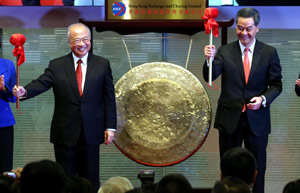Growth in telemedicine expected with aging population
Updated: 2014-11-25 06:02
By Huang Ying(China Daily USA)
|
||||||||
It is expected that the telemedicine market in China will grow to exceed 10 billion yuan within the next three years, due to the country's large and increasing aging populations, according to a report released by the Beijing-based S&P Consulting.
D-Phone Group, China's largest mobile phone retail chain store, has invested about 10 million yuan in the telemedicine industry with the establishment on Nov 15 of China-based WorldCare China.
As the exclusive representative of WorldCare International in China, WorldCare China will closely cooperate with the members of WorldCare Consortium in providing the medical resources and related services to patients in China. The partnership will allow its clients in China to receive top international medical opinions of diagnosis and treatment, saving time and effort spent in referral appointments and long-distance travel.
Founded in 1992, WorldCare International is a medical service consortium consisting of several US hospitals, and is also a world leader in the field of global telemedicine services and consultations. The alliance has as many as 20,500 doctors, and the total investment in medical research by its member hospitals exceeded $4.3 billion annually. The WorldCare Consortium includes Boston Children's Hospital, Duke University Health System, Mayo Clinic, Jefferson University and Hospitals, Partners Healthcare System, Penn Medicine and UCLA Healthcare, all of which are ranked among the top hospitals in the United States. It offers medical services to millions of members across 65 countries in the world.
"D-Phone is the initial investor of WorldCare China, and has a 20 percent stake in it," Liu Donghai, president of D-Phone Group, was quoted as saying in the 21st Century Business Herald newspaper.
With a growing population of affluent Chinese individuals seeking medical treatment abroad, many foreign medical institutions have continually come to explore the market in China, which also brought about the demand for telemedicine services in China.
In China, the number of senior citizens aged above 60 years old is about 200 million, and half of them are empty-nesters. However, the number of medical personnel is just around 6 million, making it difficult to satisfy the face-to-face medical service demands of every senior citizen, said Tian Lanning, deputy secretary general of China Association of Social Welfare, at a telemedicine forum in October.
The investment in Internet Technology in China's healthcare industry reached about 22.6 billion yuan in 2013, increasing 21.5 percent year-on-year. In the telemedicine sector, the market reached 2.16 billion yuan in 2012, and is developing at an annual growth rate of 18 percent in recent years, according to S&P Consulting.
With WorldCare International entry in the Chinese market through WorldCare China, it will first establish partnerships with hospitals in many Chinese cities through teaching, and then develop the telemedicine operation gradually. It would allow Chinese users to get the international high-caliber medical services even in China, said Wu Shixin, chief medical advisor of WorldCare China, according to the report.
It is an important step for D-Phone's swing to telemedicine investment.
D-Phone Group began to pay attention to the medical industry very early, and it officially entered this industry in May by injecting capital and human resources in the endeavor to connect the rich medical resources in the United States to the China market, according to Chen Jing, senior vice-president of D-Phone.
"Medical treatment will be an investment hot spot in the future," Chen said. "D-Phone Group has very good mobile platform. Our big problem in the future would be how to connect the mobile platform we have with the medical industry."
As the largest mobile phone retail chain store in China, D-Phone Group runs more than 2,000 brick-and-mortar stores across the country, with 80 million visits of customers annually. However, the online network it owns makes it hard for D-Phone to identify potential medical users. In the online world, its mobile terminals and application could serve to connect users with medical institutions, but there's still a long way to go before the operation could run smoothly.
The mobile solution to telemedicine services is still in discussion, but it is full of opportunities, Wu was quoted as saying in the report.
huangying@chinadaily.com.cn
- India plans high-speed rail project with China
- S. Korea to test-transport Russian coal import via DPRK port
- Dozens take refuge from Japan quake aftershocks
- S. Korea holds drill in islets disputed with Japan
- Yingluck mulls over returning to politics
- French, British banks press EU to revise bank reform plans

 Sports moments of the week: Nov 17-23
Sports moments of the week: Nov 17-23
 42nd American Music Awards held in Los Angeles
42nd American Music Awards held in Los Angeles
 A retrospection of righted wrongs
A retrospection of righted wrongs
 Top 10 kinds of foreigners in China
Top 10 kinds of foreigners in China
 Anxious Ferguson waits for grand jury's decision
Anxious Ferguson waits for grand jury's decision
 Mascots from Olympic, Paralympic games arrive in Rio
Mascots from Olympic, Paralympic games arrive in Rio
 Rio 2016 mascots combine Brazilian fauna, flora
Rio 2016 mascots combine Brazilian fauna, flora
 China's boxer Zou Shiming defeats unbeaten Thai
China's boxer Zou Shiming defeats unbeaten Thai
Most Viewed
Editor's Picks

|

|

|

|

|

|
Today's Top News
Growth in telemedicine expected with aging population
China's interest-rate cut shows willingness to stimulate growth
LA mayor touts city's ties to China
Wall St ends at records on central bank action
US admiral sees balance in US-China relationship
New York leads way in boom in real estate
Hagel resigning as US defense secretary
80% of China's rich aspire to overseas education
US Weekly

|

|







